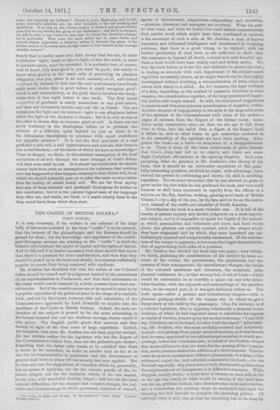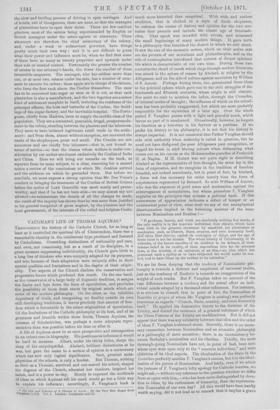TILE COOME OF BRITISH GUIANA..
=sr arosacmj
IT is very necessary, if the welfare in our colonies of the large bo.dy of labourers included in the term " coolie" is to be secured, that the interest of the philanthropic Mid the humane should be gained for them ; for the knowledge and appliances of the intelli- gent European servant are wanting to the " coolie" to hold the balance even between the might of capital and the rights of labour. And to this end it is further necessary that those should first know that there is a question for their consideration, and then that they should be posted up in the facts and details, in a manner sufficiently popular to ensure their being mastered with readiness.
Mr. Jenkins has doubtless felt that the action of our Colonial Office should be roused and its judgment backed by the earnestness of our representatives in Parliament, and that their enthusiasm in the cause would not he lessened by a little pressure from their con- stituencies. But if the constituencies are to be moved it must be by a popular exposition of the points at issue in the shape of a readable book, and not by the report, however able and exhaustive, of the Commissioners appointed by Lord Granville to inquire into the condition of the Coolie in British Guiana. Indeed, the more ex- haustive of the subject it proved to be, the more exhausting to the honest-hearted but not too studious average elector would it also prove. The English public grows first nervous and then drowsy at sight of the blue cover of large superficies. Indeed, we complain that even Mr. Jenkins has not been popular enough. He has written rather for the legislator who has the Report of the Commissioners before him, than for the philanthropic elector ; forgetting that the latter only wants to be certified that there is much to be remedied, in order to resolve that as far as in him lies his representative in particular and the Government in general shall have no peace till the remedy has been applied. But he does not care for suggestions of remedies which he, personally, has no means of applying, nor for the minute proofs of the in- justice alleged, nor for the statistics which, if he can master, he can also, with wonderful facility, forget ; still less for the local colonial difficulties, for the charges and counter-charges, the jeal- ousies and heartburnings in which governors, members of council,
the Author of " Baby," London : • The Coolie, Mlles and nap. By Strahau and Co agents of Government, magietrates —stipendiary and otherwise, —planters, attorneys and managers are involved. What the pub- lic does want, and what we looked for—and indeed unmistakeably find, amidst much which might have been condensed or omitted, is the assurance of such a man as Mr. Jenkins, a man of known humanity and cultivated intelligence and accustomed to weighing evidence, that there is a great wrong to be righted ; with his further production of such facts as are sufficient to show that this assurance is, beyond all doubt, a sound and well-founded one. Such a book would have been widely read and widely useful. We fear the book before us is too dry and elaborate to secure this end ; in dealing so minutely with each department of the subject much repetition necessarily occurs, as no single branch can be thoroughly investigated without involving a reconsideration of some other or others with which it is allied. As, for instance, the legal evidence of a debt, depending on the method of payment, involves, in some measure, the consideration together, of the large questions of impar- tial justice and wages earned. So with the relations of magistrates to planters and this same primary consideration of impartial justice. Another element of unpopularity in the style is the large admixture of the opinions of the Commissioners with those of the author— pages of extracts from the Report of the former occur, some- times many consecutive ones—so that we are apt to fall, from time to time, into the belief that a digest of the Report itself is before us, and at other times to get somewhat confused as to the ownership of the opinions we have been reading. Alto- gether the book—as a book—is somewhat of a disappointment to us. There is none of the terse incisiveness or grim humour that Ginx's Baby had led us to expect, and there are some slight Carlyleish affectations in the opening chapters. And even accepting, what we presume is Mr. Jeakins's own theory of his book, that it should be an exhaustive exposition of this pain.. fully interesting question, we think ho might, with advantage, have exerted his powers in condensing and shown his skill in avoiding repetition. But we must remember that he has allowed no grass to grow under his feet while be has produced his book, and how could humour or skill have recovered so rapidly from the effects of a sojourn on the flat, treeless, reeking, glaring mud-bank of British Guiana ?—by a slip of the pen, by the bye, said to be on the north- west, instead of the north-east shoulder of South America.
Nevertheless the book is a most valuable one. It is full of the results of patient inquiry and careful judgment on a most import- ant subject, and it is impossible to speak too highly of the manner in which personalities and bitterness and scorn and hard words about the planters are entirely avoided, while the abuses which they have originated and by which they have benefited are un- hesitatingly exposed and unequivocally condemned. If the verbose- ness of the lawyer is apparent, so too is another legal characteristic, that of appreciating both sides of a question.
Mr. Jenkins has divided his book into two parts ; very wisely, we think, prefacing the consideration of his subject by some ac- count of the colony, the government, the plantations and the systems of their management, the manufacture of sugar, the habits of the coloured assistants and labourers, the hospitals, jails, planters' residences, &c., so that we may feel, if not at home—which would be undesirable in so horrible a place—at any rate some- what familiar, with the adjuncts and surroundings of the question when, in the second part, it is brought definitely before us. The book opens—after a preface and introductory chapter—with a pleasant gossippy sketch of the voyage out, in which we get a funny story or two told by the passengers. One, for instance, is of a colonial legislator, who in opposing vehemently a proposal to tax donkeys, of which he had imported many to substitute for negroes as beasts of burden, wound up by the modest inference, I can only say, if donkeys are to be taxed, it's time I left the island." After land- ing, Mr. Jenkins, who was most cordially received and hospitably treated—not perhaps from purely unmixed motives, as it was known that he came, appointed by two philanthropic societies, to watch pro- ceedings, before the Commissioners, on behalf of the Coolies—found that he should have to wait six weeks for the opening of the Commis- sion, as the planters desired the addition of a third member. This in- terim he spent in excursions to different plantations, to a farm, a free settlement, a gaol, Sm., and collected materials for his book,—for the first half especially. Any place more utterly dreary and repulsive than the neighbourhood of Georgetown it is difficult to conceive. Wide, sluggish, muddy rivers ; a dead level of swamp on each side as far as the eye can reach, or what would be swamp if the land were not cut up, gridiron fashion, into alternate cane-beds and trenches, and a remorseless sun pouring down its unclouded rays upon the steaming hot-bed beneath to complete the charming picture. Of railways there is only one, so that the travelling has to be done by the slow and broiling process of driving in open carriages. And of hotels, out of Georgetown, there are none, so that the managers of plantations have to open their doors. There are few resident planters, most of the estates being superintended by. English or Scotch managers under the estate-agents or attorneys. These attorneys are therefore the chief aristocracy of the colony, and, under a weak or subservient governor, have things pretty much their own way ; and it is not difficult to guess what their power and influence must be, when wo find that some of them have as many as twenty properties and upwards under their sole or assisted control. Fortunately the greater the number of estates in one attorney's hands, the fewer the number of these irresistible magnates. The manager, who has seldom more than one, or at most two, estates under his care, has a number of over- seers to execute his orders ; these again are in charge of the drivers, who form the first rank above the Coolies themselves. The cane has to be converted into sugar as soon as it is cut, so that each plantation is also a manufactory, and the two together are a minor kind of settlement complete in itself, including the residence of the principal officers, the huts and barracks of the Coolies, the build- ings of the sugar-factory, and the inevitable hospital. The Portu- guese, chiefly from Madeira,'seem to supply the middle-class of the population. They are a contented, peaceable, frugal, prosperous ele- ment in the colony, standing between the planters and the labourers. They seem to have initiated legitimate retail trade in the settle- ment; and from them, almost without exception, are recruited the ranks of the shopkeepers, great and small. The Creoles are not numerous and are chiefly free labourers—that is, not bound to terms of service—so that the classes whose welfare is under con- sideration by our author are almost exclusively the Coolies of India and China. Here we will bring our remarks on the book, as separate from its main subject, to a close, reserving for a second notice a review of the conclusions at which Mr. Jenkins arrived and the evidence on which he grounded them. But before we conclude, we must express a strong opinion that Mr. Des Vceux's conduct in bringing the treatment of the Coolies of British Guiana before the notice of Lord Granville was most manly and praise- worthy, and that if he has not been able—we may almost say not allowed—to substantiate the details of all the charges he made, the result of the inquiry has shown that he was more than justified in his general complaint of gross neglect, by the planters and the local government, of the interests of the exiled and helpless Coolie.



































 Previous page
Previous page